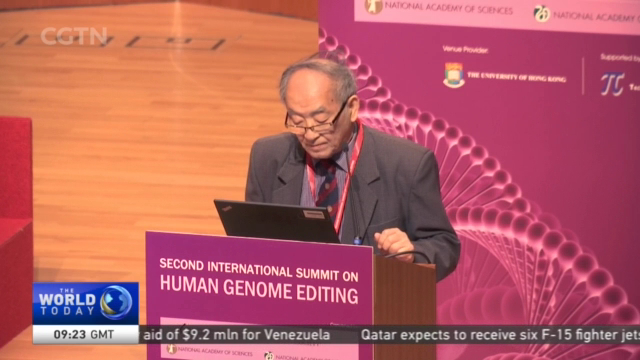
19:04, 27-Nov-2018
Gene-Edited Babies Born? 'Breakthrough' claim triggers massive debate
Updated
17:55, 30-Nov-2018
02:45

The debate is becoming increasingly heated surrounding a Chinese researcher who has claimed that gene-edited babies were born in China. The DNA changes will enable the pair of new-borns to resist possible future infections with HIV.
The debate took the spotlight at a three-day international conference in Hong Kong. More than 500 top scientists, experts and stakeholders discussed the application, ethical implications and governance of human genome editing science and technology. Some participants voiced their concerns over the possibility of genome editing, which might lead to heritable alterations.
QIU RENZONGCHINESE BIOETHICIST, CHINESE ACADEMY OF SOCIAL SCIENCES "The genetic-modified embryo is prohibited from been imported into certain human or animal reproductive tract, so what Doctor He did violated certain regulations. Human genome manipulation by gene-editing for prevention or will change the general of human gene pool. How could Doctor He and your team change the gene pool of human without considering consulting other parts of human species?"
DAVID BALTIMORECHAIR OF SUMMIT ORGANIZING COMMITTEESECOND INT'L SUMMIT ON HUMAN GENOME EDITING "I cannot say if he (Doctor He) is reliable or not. I haven't seen any of this research, and I don't know what he is planning to claim, so it's very hard to say. But it is unfortunate that his work has not been peer reviewed. So there is not an independent analysis of it by an expert."
LAP-CHEE TSUIGENETICIST, PRESIDENT OF THE ACADEMY OF SCIENCE OF HONG KONG "We can not make any comment or criticism before he gives his speech at this conference. I've read the news but to be honest, I am not sure about the credibility of what's been reported, as there could be fake news. We have to listen to himself speaking first. About the claim, we have issued a ten-point guidance in our report published before. From a Scientific point of view, gene-editing research is accepted, but you have to do it under certain rules and basic principles."

SITEMAP
Copyright © 2018 CGTN. Beijing ICP prepared NO.16065310-3
Copyright © 2018 CGTN. Beijing ICP prepared NO.16065310-3